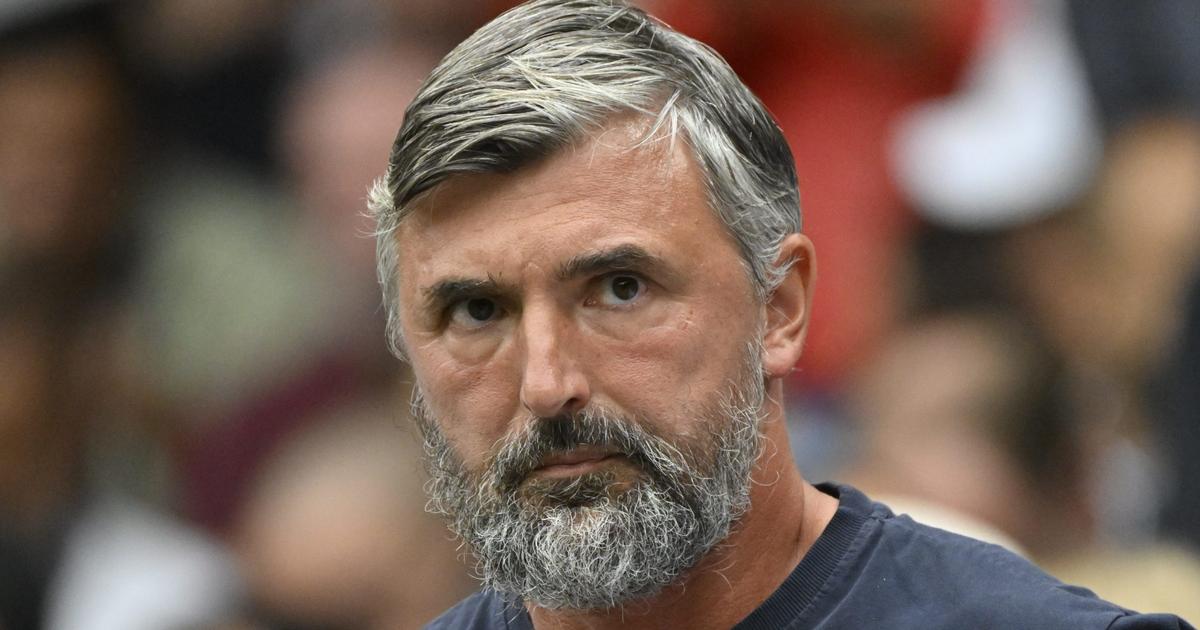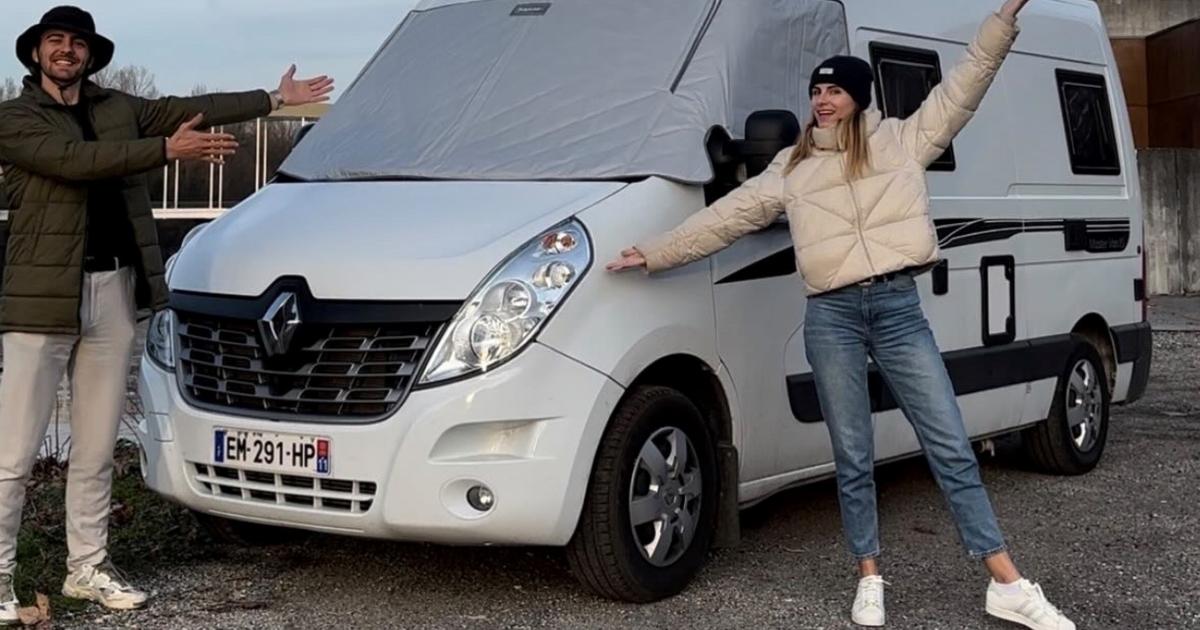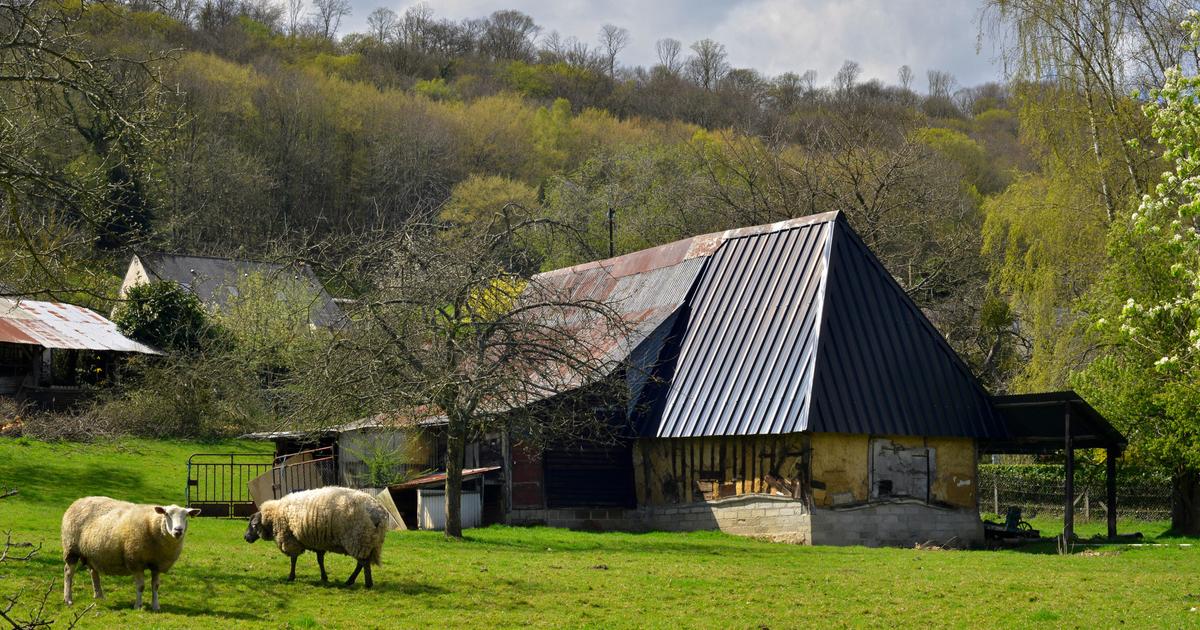Icy squalls whip the small center of Vinneuf (Yonne). It's Monday morning, the village of 1500 inhabitants, at the gates of Ile-de-France, is still dozing. Disposable gloves in the hands, Saoussan and Mohamed, a young couple, are busy in the small supermarket they have just taken over. The only food trade reopened the day before. An air bubble, two weeks after the start of confinement due to the coronavirus epidemic.
"People were relieved, an old lady even started to cry," says Saoussan. A handful of customers flock, distant from each other. "Here, the crisis, we do not see it too much, it is especially for the races that it is complicated", comments Grégory, 32 years old, big beefy with shaved head. Her children have a garden, so "it's okay". He is employed in the construction industry, now on partial unemployment. "It will be fine for this month, but it shouldn't last."
A stone's throw away, the tobacco-press-bazaar is the other place to live in the town. "There isn't a lot of traffic, but when people come, they stock up," says Teoman, 18, who lives behind the counter. Confinement, he does not respect it "too much", he admits, conceding to hang out alone or with his girlfriend. The gendarmerie watches, however. They verbalized a client the other day: he did not have his exit certificate.
Vacuum diagonal
Outside, a few passages of cars sweep the silence. A passerby tells us about the house of Thérèse - a retired Parisian who fled the capital after the first round of the municipal elections - further down the street. "I found the atmosphere scary, so I left," said the woman, in the doorway. Former biologist researcher at the Institut Pasteur, 86 years old, she follows the crisis with an attentive eye. But from a distance. "Here, I have the garden," she slides, her eyes clear, wrapped in a thick pink turtleneck. Born in Aisne, she experienced "the exodus" during the Second World War: "I thought about it when I left Paris. By tidying up here, I also found an old ration ticket. ”
Others received a drier reception. "We got collared severe, based Parisians, calves' heads, you'll bring us the virus," tell these cross Parisians Yonne who fled the capital just before confinement.
Once you leave Vinneuf, you find the horizon. Both feet in the "diagonal of the void", its landscapes of fields bordered by power lines. At the time of the coronavirus, this France which defies densities has the appearance of Eden, but is it better equipped to face the epidemic wave, which has - for now - rather spared it? On April 1, there were only 8 deaths recorded in the Yonne out of the 4,000 dead in France.
Head south, along roads that seem shunned, tired facades of town centers. Everywhere, closed storefronts, with the exception of bakeries. A yellow cardigan hanging on a window recalls a past crisis. Here too basic sanitation is often lacking for those on the ground despite the epidemic. Solidarity then makes up for the lack.
Political Newsletter
Every day, political news seen by Le ParisienI'm registering
Your email address is collected by Le Parisien to allow you to receive our news and commercial offers. Find out more
In Sens, twenty kilometers below, the deputy (LREM) Michèle Crouzet has used part of the envelope she has to provide caregivers and police in masks and gel. The chosen one pays for the material, a mother - and a seamstress - graciously takes care of the masks, a gel veterinarian. "It is our meager contribution to the war effort, as we say," smiles Jocelin, the veto in a blouse.
"For once, our rural side protects us a little"
Still lower, the D3 slides us to Villiers-Saint-Benoît, its approximately 500 inhabitants. As in many homeless people, the mayor is on the front line. Patrick Büttner, 72, rectangular glasses and cheeky mustache, distributes travel certificates in letter boxes, goes shopping for the oldest, with a handful of elected officials. For anxiety or for security, many prefer to hide. "For once, our rural side protects us a little," says this former physiotherapist. A little, but until when? He is preparing, in continuous contact with the “local buddies mayors” for the arrival of the virus.
Resourcefulness is also organized between residents. A WhatsApp group between 6-7 neighbors has been created to pool races, minimize risks. Among them, Francine and François-Xavier, enjoy the sun in their garden. They arrived from Suresnes (Hauts-de-Seine) just before confinement. "We had to avoid coming into contact with the virus," explains the couple, whose health is "fragile". “Here, we are among the lucky ones, we know that. But the concern is still there. ”
In Villiers, the crisis has also "delayed the installation of fiber!" Laughs Patrick Büttner. In rural areas, mobile coverage like the Internet is often in its infancy. "When children send me a text at 10 p.m., I often receive it at 6 a.m. the next day!" abounds Joël, resident of the town. And the white areas drool more than the others at the time of confinement.
"To connect to the Internet, between 10 am and 12 noon, it's war!"
Solange Silvan is an elementary school teacher and representative of the Unsa union in Cravant (850 inhabitants), around 20 km south of Auxerre. “To connect to the Internet, between 10 am and 12 pm, it's war! Some families have a very poor connection, sometimes the attachments do not pass, or often they do not have a printer, ”lists the teacher. So certain instants sometimes print the homework themselves, deliver it to the parents, despite the confinement and the risk, in order to ensure "educational continuity". An obstacle course. "The goal is not to widen the inequalities that already exist between the students," says Prof de Cravant.
Same pain for his daughter, Léonie, 12, in the 5th grade. Between 10 and 12 hours, you have to "fight" to get the best out of bandwidth. Through the window of his little house, the teenager confesses to having been "anxious" by the beginning of confinement, but "it's better". Friends are missing, too. Skype, when the Internet allows it, helps reweaving loose links, and keeping morale high.
The older ones often have no connection. "Friends, we signal them from afar. We no longer have the right to accumulate each other ... ", blows a granny in a flowery blouse, a hundred meters away. She has "reading, my cats", a radio "which only receives France Bleu". Our car radio will allow us almost only to alternate between France Info, in "100% Covid" mode, or Nostalgia, to aerate the neurons a bit. "Let me dance" sizzles Dalida, finally a little Covid too.
"Bullshit" to entertain the small confined world
Arriving at Coulanges-sur-Yonne, at the gates of the Nièvre - less than 600 souls on the clock - it's the Queen who shakes the ambient torpor. It is past 6 p.m., two speakers placed on the windowsill of the Hôtel du Lion d'or make the very punchy “Don't Stop Me Now” thunder. And dance ... A massive brown bear. Under the suit: Guillaume, 42, co-manager of the business, who is also tobacco-press - "And the tiercé, does it still work?" asked a lady. “And happy confinement!” He says to a client who has come to refill his nicotine levels.
Every other evening, he pushes the volume to the limit, an hour, does "bullshit" to entertain the small confined world of Coulanges. All broadcast on Facebook. "It makes the animation, and I piss myself off," confides the guy, as happy as he was worried about the drop in traffic in his business. Failing to fill his nine rooms, he and his partner offered him at the small hospital in Clamecy, further south, on the Nièvre side, to welcome nursing staff free of charge.
"Auxerre is already affected by the wave, we have not yet"
Over there it's still calm. At the start of the week, this department had not yet recorded any deaths (three since then). Most of the patients received in Clamecy return home, a handful of more worrying cases have been referred to Auxerre, because there is no resuscitation service here. “Auxerre is already affected by the wave, we have not yet. If the effects of containment act, some departments may escape it, "hopes Dr. Boubia, emergency doctor.
The Nièvre is rather spared, but it bites the nails, anyway. Vanessa, 41, a liberal nurse in Varzy, has her face eaten by her mask. She now limits her visits to those who cannot do without her care, but trains to find protective equipment, enough to disinfect her work tool. Local schools provided him with overcoats; there again. “At first, we thought we were preserved here. We didn't believe it. But it will inevitably happen, “worries the mother. One of his colleagues, towards Auxerre, refused to go to a “patient Covid”, not feeling protected enough. Higher up in the village, the 130 tenants of the Ehpad les Petites Promenades are sealed.
"We are confined all year round, there are 15 people!"
But even in rural areas, not everyone is equal when it comes to containment. To see it, you just have to sneak up to Parigny-la-Rose, not far away, sheltered from the main roads. A few handfuls of houses, not even 40 residents on the register. "We are confined all year round, there are 15 people!" Laughs Jean-Marie, a young retiree, from his terrace.
Here, the health crisis has not yet altered the taste of spring. "We hear the silence even more than before," slips his wife Catherine. It is used in a clinic, at a few terminals, which discharges Nevers from certain patients. Like "the impression of being in a bad film".
We then cross the Loire, to the west, to land in the Cher and meet those whom work confines in the fields. In the wine sector of Sancerre, sales are stopped, but there is work to prepare for the arrival of the next harvest. "Nature continues, but the world is at a standstill ..." loose Vivien, 20, crossed between two vine plants on the Cherrier estate.
On that of Eric Louis, it is the cessation of export, especially across the Atlantic, which will be expensive. Small shipments to wine merchants who sell take-out, in Paris in particular, have gradually resumed. The period is more delicate for the market gardeners, who must sell their vegetables, and are planting at the moment what will make their livelihood in the months that follow. "This is the period when you are prohibited from catching a cold!", Comments Chloé Delétang, 34, living in Sancerrois. She has a small cultivation area, does direct sales, but refuses to approach her customers.
The coronavirus crisis? A surplus of orders, new barges, less rushed than usual to go and pile up in the supermarkets around. "There are people who have found their way back to the producers ...", agrees Pascal Tissier, a market gardener-cerealist aged 59, with a beard and a wrinkled face. Installed lower, in Herry, estimates him to have "the chance to work outside", but does not abuse it, promised. He wears gloves on the market - "we watch out and then that's it" -, but regrets not having found a mask.
"There is always 10% irreducible"
In rural areas, “it's very complicated to have equipment. Overall, the second line went to the front without a helmet and without weapons, "deplores Jany Siméon, president of rural mayors of Nièvre, using the warlike metaphor of Emmanuel Macron. He notes that people "understood" the value of confinement, even if it took a little time. "There is always 10% irreducible," regrets Colonel Sébastien Baudoux, of the Gendarmerie group from Nice, whose men crisscross the entire department every day. People understood that they had to have their certificate, which does not prevent some from going to the butcher several times a day, the little old people to meet at the pétanque, the young on the roofs of buildings. We must continue to watch.
The rural departments dodge the crisis, for the moment, with rarely more than a dozen deaths in those who draw the diagonal of the void. But they dread it. Because if the virus were to wander there, the health infrastructures are fewer, less armed than elsewhere.
The signs "Emergencies in danger" or "Hospital on strike" still there
The day slowly declines in Nevers, capital of Nièvre and which also has the only large hospital in the department, with an intensive care unit. By mid-week, the hospital had been able to double its number of “sheave” beds, going from 9 to 15 beds with “heavy respirator”. At the entrance to the emergency room, there are always signs "Emergencies in danger", "Hospital on strike", reminding that the public hospital was in crisis before the arrival of Covid-19. The director, Jean-Michel Scherrer, reached by telephone, reiterates the preparation of his troops. "We will take a different course because the confinement arrived here quite early", he hopes, "optimistic".
We are watching for the threat here as during a vigil of arms. The virus has so far pleased to roam the cities, it has long seemed "far". It is less and less. Ready to take the key to the fields.


/cloudfront-eu-central-1.images.arcpublishing.com/prisa/E2EZVIKBGZFFDNOPKYHH3XGITI.jpg)






